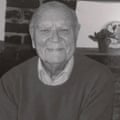Norman Spencer, who worked on some of the most acclaimed films made in Britain in the 1940s and 50s, has died at the age of 110.
Spencer worked as a producer, screenwriter, production designer and actor, most frequently with longtime collaborator David Lean. After meeting in 1942, they went on to work on movies including Blithe Spirit, Great Expectations, The Bridge on the River Kwai and Lawrence of Arabia.

He also served as assistant producer on Joseph L Mankiewicz’s Suddenly, Last Summer (1959), starring Elizabeth Taylor, Montgomery Clift and Katharine Hepburn, as well as producing 1971 car chase classic Vanishing Point and Richard Attenborough’s apartheid drama Cry Freedom (1987), starring Denzel Washington.
The news was announced by the European Supercentenarian Organisation, who reported that Spencer died in Wimbledon on 16 August, three days after his birthday. He was believed to be the oldest man living in Greater London, and the second-oldest man living in the UK. The oldest man in the UK, and the world, is 112-year-old John Tinniswood, who was born the year the Titanic sunk.
Spencer’s first credit was as third assistant director on Lean’s debut, In Which We Serve (1942), in which he also played an officer in a small role. Two years later, alongside Lean, Noël Coward, producer Anthony Havelock-Allan and film-maker Ronald Neame, he launched Cineguild Productions, responsible for many of the classic British films of the immediate postwar period.
For Lawrence of Arabia, Spencer was tasked with liaising with Moroccan royalty including King Hassan II, as well as wrangling 800 camels and riders and 600 other men to play the foot soldiers in the epic battle scenes.
Spencer said he and Lean bonded when they started going to the movies with their wives together; Spencer married Barbara Sheppard in 1943, and the couple had two children.
He later recalled to the Guardian how charismatic his friend and colleague was. “David was so handsome,” he said. “He was a huge womaniser: to my knowledge, he had almost 1,000 women. When we shot [Hobson’s Choice (1954)] in the streets, people asked: “Who’s that good-looking actor?” I had to say: “That’s not the leading man, it’s the director.”

 1 week ago
8
1 week ago
8




/cdn.vox-cdn.com/uploads/chorus_asset/file/24371439/236492_MacBook_Pro_16__2023__AKrales_0247.jpg)

:quality(85):upscale()/2024/09/09/791/n/49351773/91e1c31e66df37933d9bf8.44427956_.jpg)

 English (US) ·
English (US) ·